Pomegranate fruit is considered a favorite fruit in many people. The tree grows in the subtropical and tropical zones of the planet, but is very popular in our country. Everyone eats the pulp of fruits, but not many people know that it is possible to eat pomegranate with seeds, whether they contain useful substances or harm the body.
On this score, there are mixed opinions of experts: some argue that the seeds contain a lot of useful substances, others that the bones provoke the development of diseases. In this case, it all depends on the amount of grains used and the individual sensitivity of the body.
Content
The benefits of pomegranate seeds and calories in 100 grams
The granular part of the fetus is no less nutritious and healthy than its flesh. Bones are dietary carbohydrates - fiber, which is not digested by the digestive system.
Dietary fiber, passing through the gastrointestinal tract, removes toxins, toxins of biological origin, other harmful products of the body’s vital functions, help women during menopause and menstruation, men increase potency. However, they must be chewed, but not swallowed whole, otherwise the nucleoli do not bring any benefit.
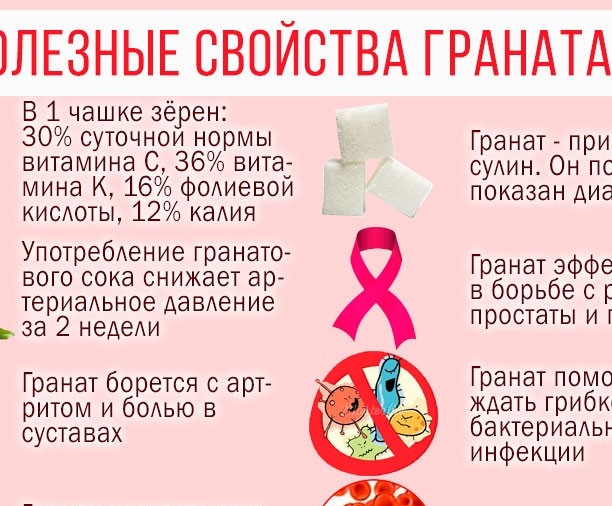
The calorie content of the fetus per 100 grams, together with the seeds, is 70-83 kcal, without stones - 20 units less.
Chemical composition
The solid part of the fruit includes many useful mineral trace elements, vitamins, polyunsaturated acids. Grains go to the production of healing oils, which are used in dermatology, cosmetology, therapy. Linoleic, saturated carboxylic, oleic and stearic acids are the basis of the resulting oils.
The composition of pomegranate kernels includes the following useful substances:
- Vitamin A - retinol, supports the function of vision;
- Vitamin B - thiamine, riboflavin, pantothenic acid normalize metabolic processes, turning proteins and carbohydrates into energy, stimulate the nervous system;
- Vitamin E - Tocopherol improves overall health;
- calcium, sodium and potassium;
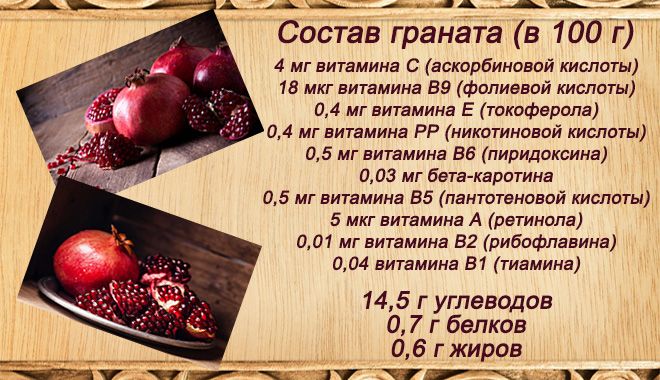
Pomegranate Composition - nicotinic acid prevents vitamin deficiency, has a vasodilating effect;
- phosphoric compounds;
- various fatty acids;
- polyphenols protect DNA cells from carcinogens, degrease food;
- iron.
Seeds contain starch, cellulose, ash, tannins - tanides, iodine. The benefits of eating seeds have been proven by scientific research in the medical field. Positive properties are used to treat various pathologies, solve dermatological problems, prepare medicines and alcohol tinctures.
Healing properties
Pomegranate seeds have a lot of beneficial properties for the body. However, they should be chewed, not just swallowed. With this use, pomegranate has such an effect on the body:
- relieves inflammation;
- relieves the body of toxins, toxins;
- normalizes stool with diarrhea;
- helps with headaches;
- normalizes metabolic processes;
- contributes to the work of the endocrine glands;
- increases mental abilities;
- reduces toothache;
- reduces pain during menstruation;
- enhances male potency.
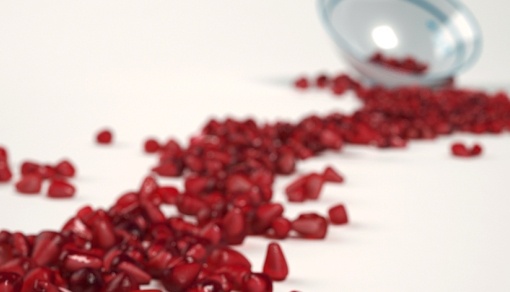
Grains are recommended for people with diabetes, helminthic invasions. They are useful to women in menopause and during pregnancy.
Lovers of strong drinks, strong coffee, chocolates, fried and spicy dishes, will not be amiss to systematic use of pomegranate seeds. Under the influence of these and other food irritants, the mucous membranes of the digestive organs become inflamed, which can lead to the development of gastritis and peptic ulcers. The tannin in the solid structure of the fruit promotes the formation of a protective layer from the precipitated protein on the mucous membranes of the digestive tract.
The solid structure contributes to the treatment of pathologies of the genitourinary system. Regular eating pomegranate kernels reduces the risk of developing breast cancer in women and prostatic hyperplasia in men.
Is it possible and how to eat pomegranate with stones
Doctors recommend the use of fruit bones to patients with diabetes. Using 100-150 g of carefully chewed seeds, a person receives the necessary daily dose of nutrients. Adding pomegranate seeds to food leads to the following positive results:
- Bad cholesterol is excreted, which contributes to the formation of intravascular plaques.
- The walls of blood vessels damaged by the formation of cholesterol plaques are strengthened and restored.
- The body is saturated with essential amino acids and other beneficial substances.
- The liver and digestive organs are cleaned of toxins and toxins.
- The concentration of sugar in the blood decreases.
How to clean
There are several rules for cutting the fetus to preserve the healing properties of the bone. An often used apple cut reduces the nutrient content, making pomegranate a regular overseas dessert.
The fruit peeling sequence consists of the following:
- Garnet is washed under running water.
- With the help of a sharp knife, the place of inflorescence in the upper part of the fetus is removed.
- Cautious small cuts are made from the cut-off point of the inflorescence to the bottom of the pomegranate, leaving a hollow peduncle.
- The grenade is mounted on a horizontal area, pressed by hand on the upper part. Slices along the edges of the incisions should open in the form of flower petals.
- A pomegranate slice is carefully separated without disturbing the grain structure.
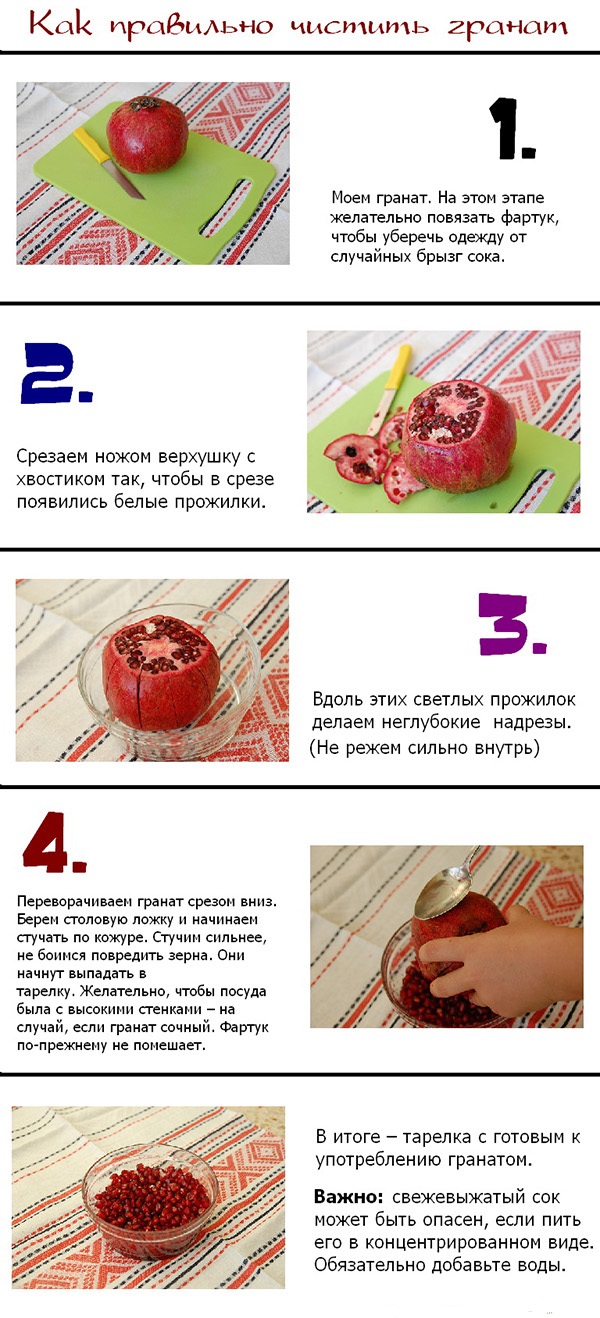
The pulp can be eaten along with the seeds, after chewing them carefully.
Notches should be made at the points of deepening of the lobules. Juice escaping from the notches indicates improperly sliced pomegranate.
You can separate the seeds from the pulp by hand or by gently tapping the peel with a spoon. Sometimes the fruit is cut in a container of cold water. This prevents scatter on the nucleolus table. The latter settle to the bottom of the plate, and film membranes with peel rise to the surface.
Rules for the use of seeds
Eating seeds implies some caution, they should be chewed slowly to obtain a homogeneous consistency. Otherwise, they do not bring the desired therapeutic effect and exit the digestive tract in an unchanged form.It is believed that whole or poorly chewed kernels provoke inflammation of the appendix. However, proponents of the opposite theory argue that such a small grain size cannot block the ducts of the cecum.
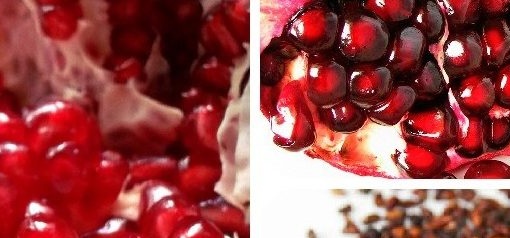
Eating pitted fruits is recommended under the following conditions:
- nucleoli are quite soft;
- no diseases of the mucous surfaces of the oral cavity;
- There are no individual contraindications for use.
To improve the absorption by the stomach of chewed hard grains, it is necessary to use them together with the pulp. When using only one seed, it is recommended to dry them in a warm, non-sunny place, and then grind in a coffee grinder. The powder is used as a dietary supplement. Alcohol tinctures on pomegranate seeds reduce the formation of cholesterol plaques, prevent respiratory diseases, and reduce foci of inflammation.
Contraindications
The seeds of the pomegranate fruit can bring not only benefits, but also harm if they are used more often than once a day and if there are individual contraindications, such as:
- pathology of the intestinal tract, stomach;
- steady decrease in blood pressure;
- thinning of tooth enamel;
- increased gas formation;
- constipation;
- colon inflammation;
- hemorrhoids.
Possible damage to the bones
Excessive consumption of seeds causes difficulty in defecation instead of relief. This is due to the fact that the grains are practically not digested by the stomach. A similar condition is usually observed in young children. Hard seeds cause gum damage, inflammation, or swelling. Therefore, it is not recommended to eat them more often than once a day. Bone essential oils can lower blood pressure, which makes pomegranate a forbidden fruit for hypotensives.
To prevent negative consequences, an adult can consume no more than 200 g of fruit with seeds per day, for children a maximum of 150 g.
In childhood, during pregnancy
Pregnant women often lack vitamins for healthy fetal development. Microelements contained in pomegranate seeds help the formation of tissues and organs of the fetus. Using a subtropical fruit at least twice a week, a future woman in labor will prevent the development of various forms of toxicosis in the first and third trimesters, swelling, strengthen the circulatory system, and increase immunity. Before using a pomegranate with the bones of a pregnant woman, it is recommended to visit a doctor.
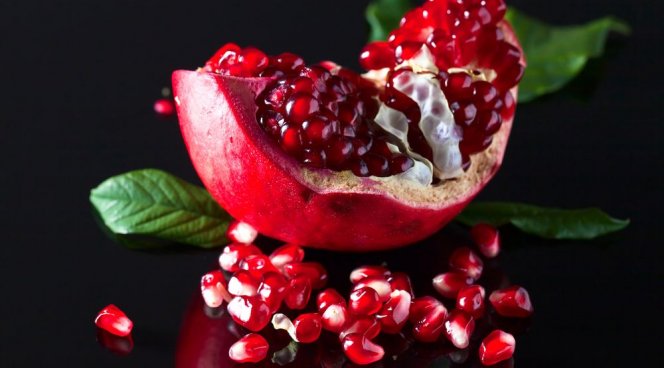
Coarse fiber is able to cause disruption of the digestive process in the child’s gastrointestinal tract that has not yet formed. After this age, 2-3 nucleoli can be given no more than once a week. The fruits should be ripe, with soft kernels, so as not to scratch the mucous surface of the oral cavity. Parents should ensure that the child chews the kernels carefully. The latter can be crushed into powder and mix a small pinch with milk or honey.
The use of crushed seeds will prevent the occurrence of anemia, which often occurs in early childhood.
Common questions
The use of fruits and vegetables unusual for our latitudes has always raised many questions. Some answers to them are given below:
The moderate use of pomegranate with seeds prevents the occurrence of many diseases. Nuclei contribute to the elimination of toxins, toxins, saturate the body with useful trace elements, vitamins. However, it is recommended to chew or grind the seeds, the opposite can lead to intestinal obstruction.

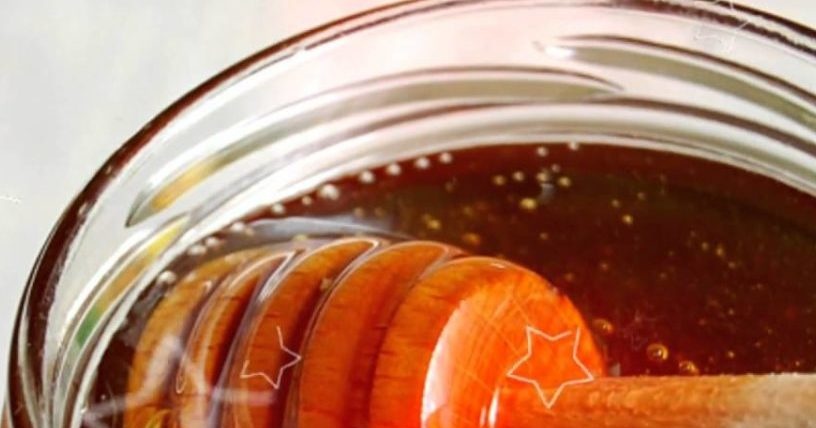
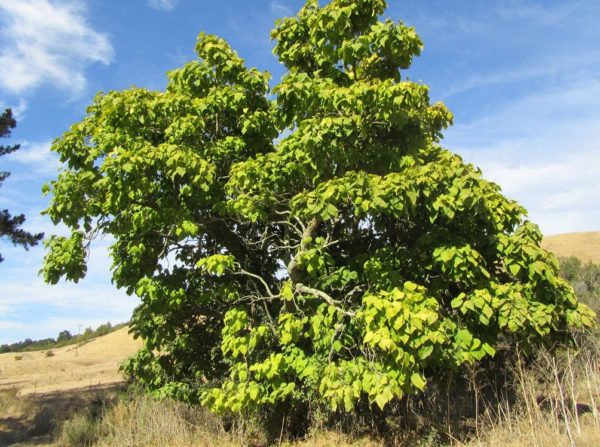
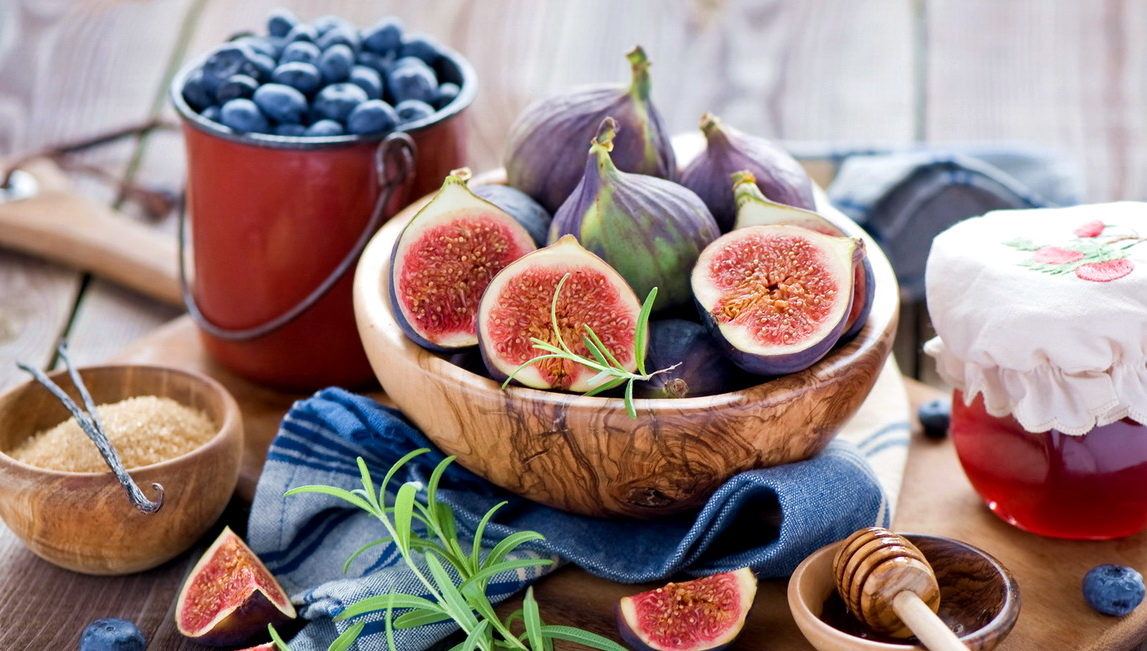
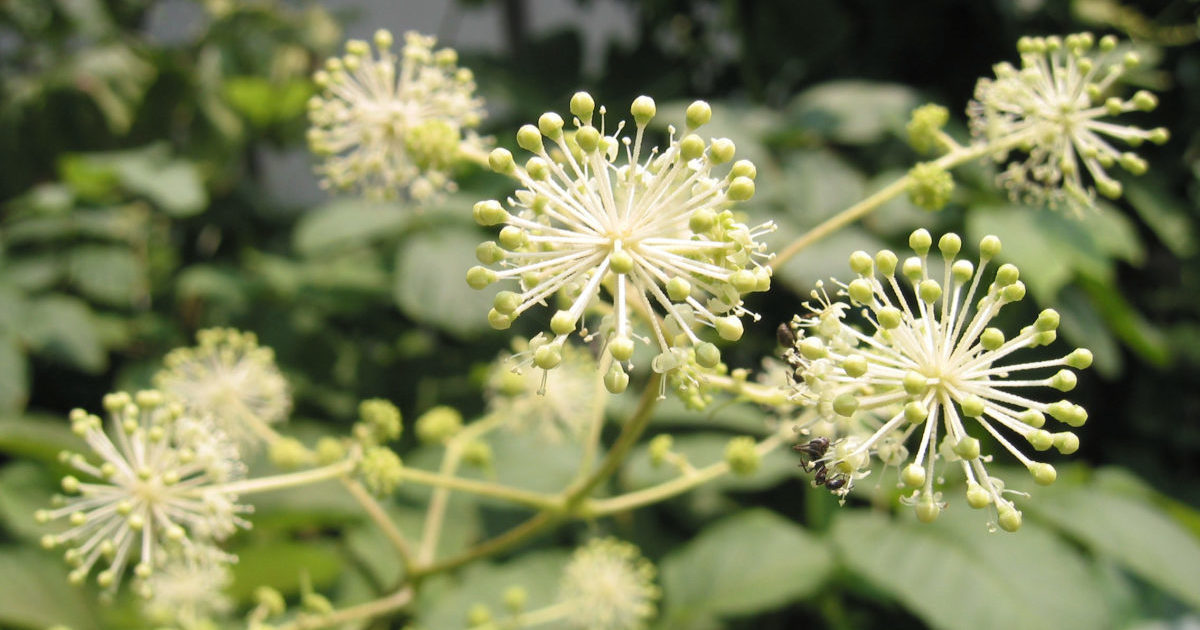 Aralia Manchurian - medicinal properties and contraindications, the use of tinctures in bodybuilding
Aralia Manchurian - medicinal properties and contraindications, the use of tinctures in bodybuilding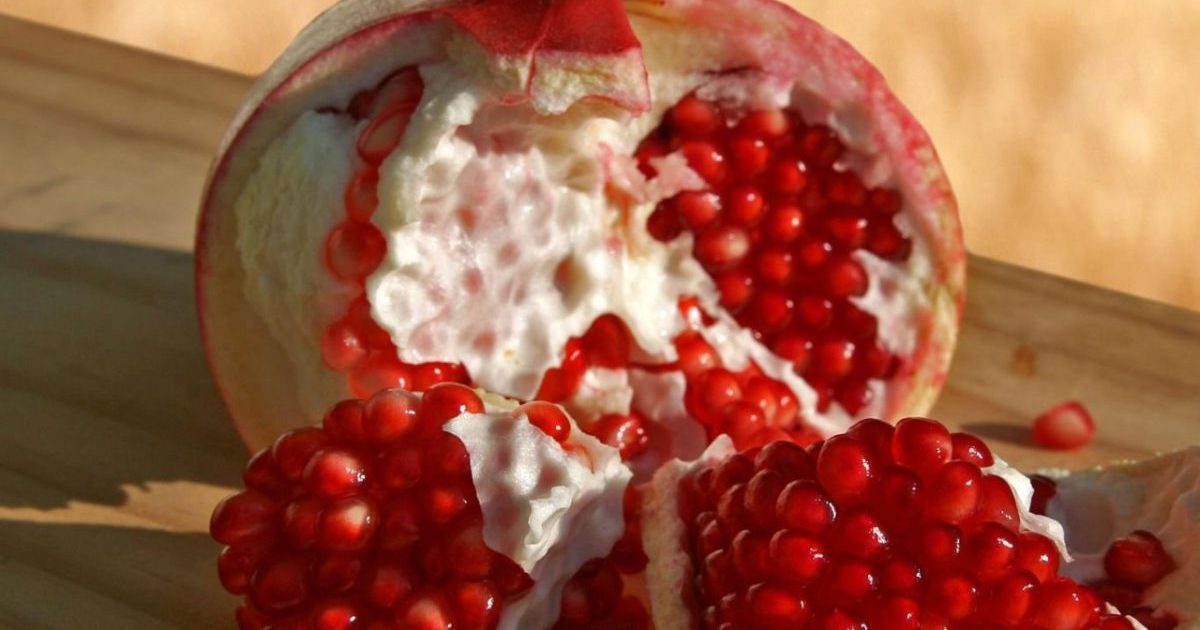 Seedless pomegranate - cutaway appearance, benefits and harms
Seedless pomegranate - cutaway appearance, benefits and harms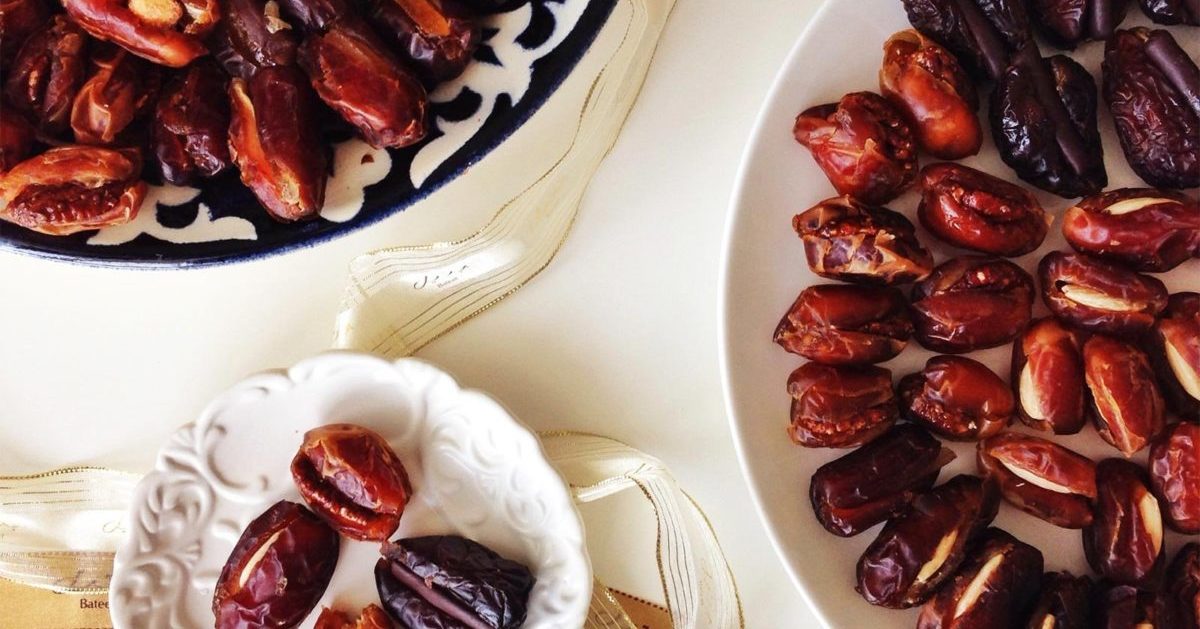 Dates - the benefits and harm to the body, how much you need to eat, properties and calorie content
Dates - the benefits and harm to the body, how much you need to eat, properties and calorie content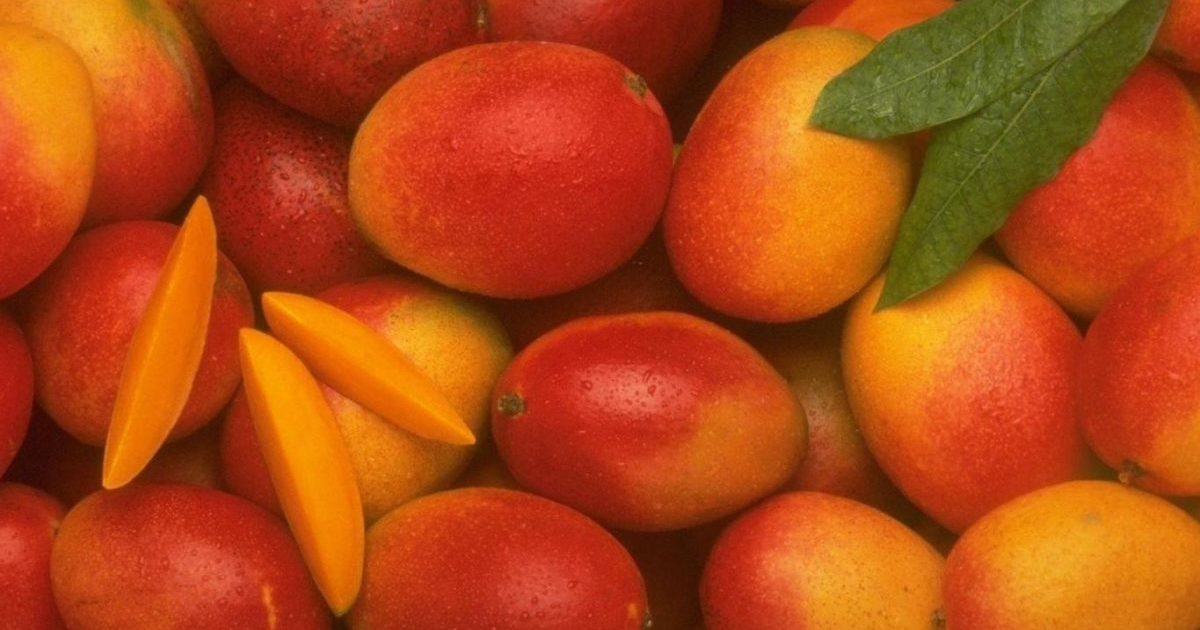 The benefits and harms of mango for the body of women and men - how to eat it?
The benefits and harms of mango for the body of women and men - how to eat it?
Materinstvo.Info
Currently, there are more than 100 varieties of pomegranate large, smaller, sweet and tart, with a hard bone and those whose bones can be eaten without threatening to damage the intestines. Pomegranate grows well and ripens in Turkmenistan and Armenia, Georgia, Azerbaijan, the Kuban and the Crimea. The most common varieties are: Vanderful, Akdona, Juicy, Nikitsky early, Gyuleysha Krasnaya, Kizil-anor, Nana. At home, pomegranate is often grown due to its very decorative flowers of bright orange lanterns. Small fruits are formed on a small home tree, but they are usually inedible.